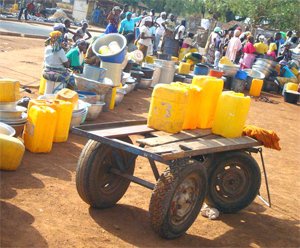- Home - News
- TWI News | TV
- Polls
- Year In Review
- News Archive
- Crime & Punishment
- Politics
- Regional
- Editorial
- Health
- Ghanaians Abroad
- Tabloid
- Africa
- Religion
- Election 2020
- Coronavirus
- News Videos | TV
- Photo Archives
- News Headlines
- Press Release
Regional News of Sunday, 14 February 2016
Source: GNA
Water tankers sent to aid Nsawam-Adoagiri crisis
The Ministry of Water Resources, Works and Housing has deployed services of water tankers to residents in the Nsawam-Adoagiri Municipality to help alleviate the acute water shortage of the area.
The water tanker services are to serve six towns and villages including Medie, Ntoaso No.1, Ntoaso No.2, Owuraku, Hebron and Adoagiri.
The deployment of the water tankers is being executed by the Ghana Water Company Limited, National Disaster and Management Organisation and National Security Secretariat.
An excavator has also been deployed to dredge the Densu River to allow the flow of underground fresh water to enhance the water level at the Nsawam treatment plant.
During a visit to the treatment plant by a team from the sector ministry and the Ghana water company led by Mr Samuel Yaw Adusei, Deputy Minister of Water Resources, Works and Housing, the Ghana News Agency observed that the Densu River was virtually dried up.
The river, which is the major fresh water source for the 2.5million gallon capacity treatment plant, is filled with so much silt that the team could walk on a dry river bed.
The river with a maximum level of 17metres had dropped to its minimum level of two metres and the intake pipe which is normally buried in the river to feed the plants with fresh water is currently hanging at five metres above the current water level.
Mr Adusei said as part of the Ministry’s long term goal, a 500 million gallon reservoir would be built to ensure the availability of fresh water and keep the treatment plant functioning.
He said the current situation of the river could also be ascribed to factors such as climate change, severity of the harmattan weather and farming activities along the banks of the river.
Mr Adusei said with the help of the national security they intend to stop any human activities along water resources and this is besides the conduct of a geophysical survey to test the viability of ground water to aid the supply of water for the area.











